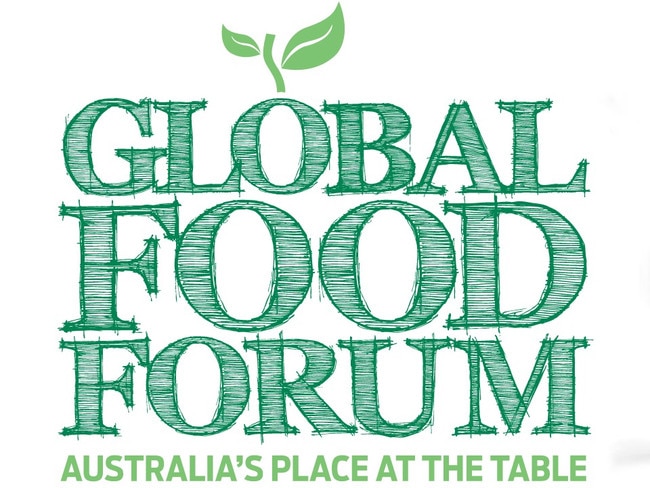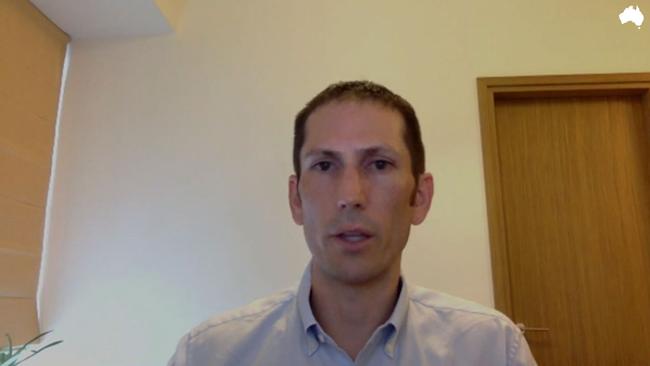Global Food Forum: Meat alternatives align with values, says Impossible Foods
New players say plant-based foods are aligning with more people’s values, but the livestock industry says there’s a lot of disinformation around.
The second and final day of The Australian’s Global Food Forum has now wrapped up.
In wide-ranging discussions, panellists said regional Australia has huge potential for food production growth, but that growth will be dependent on securing capital, especially from foreign investors.
Another theme to emerge in Thursday’s discussions was the way that COVID had accelerated existing trends in the agricutural and food production sectors, such as consumer interest in where food comes from and climate change.
Managing drought and the next downturn in the market would also be key challenges, speakers said.
Canada’s Public Sector Pension Fund’s Global Head of Natural Resources Marc Drouin began the day, giving the keynote this morning.

The first panel of the day the discussed who was buying Australia farms and food business, before Elders chief executive Mark Allison chatted with Sky News Business Editor Ticky Fullerton.
Business shifting to the regions was also a topic for discussion on Thursday, with SPC sharing manufacturing success stories it says other companies can replicate.
Bega Cheese executive chairman Barry Irvin discussed the dairy industry with agribusiness specialist Sue Neales, saying there was still room for the industry to grow despite the pandemic.
The recent explosion in plant based meat alternatives was the topic of the final panel of the day, titled To Meat or Not to Meat: Can the beef industry survive in a zero carbon economy?
- Read more great stories on The Australian’s Global Food Forum page.
11.57am: Carbon capture crucial
Mr Clarke said it was crucial to store the maximum amount of carbon in soil and trees to reduce emissions.
“We need to sequest as much carbon as possible under the ground. Livestock production is the best tool to do this,” he said.
“If we remove livestock from places like Sub-Saharan African we reduce manure and then you have to use chemical fertilizers to grow enough of these legume grains to supply the demand that they see.”
“If you remove livestock you remove one of the key ingredients to grow grasses and crops in a sustainable manner.”
11.55am: More reducing meat
Mr King said while the percentage of vegetarians in the population has remained stable, there has been an increase in the number of consumers choosing to reduce their meat intake.
“A lot of the world’s largest meat producers have all launched meat alternative brands. They are realising that relying solely on livestock to feed the world is not sustainable.”
Mandeville Meat Group chief executive Tim Clarke said alternative proteins should not be denigrating the meat industry, when the sector will be part of the solution to climate change.
“You never see the wool industry criticising the cotton industry,” he said.
Mr King agreed that it was not a “one or the other” approach, but important to produce a mix of livestock and alternatives to meet global protein demands.
11.45am: We’re OK, say meat producers
Meat and Livestock Australia Managing Director Jason Strong said he disagreed with the idea that the country’s meaty industry was under attack from plant based proteins.
“Consumers are very committed to red meat, but sadly we are seeing commentary which misrepresents facts,” he said.
But Food Frontier chief executive Thomas King said meeting the demand for our population’s protein required producing a mix of meat alternatives.
“One in three Australians are now eating less meat, we would classify them as flexitarians. The research shows interestingly that baby boomers are leading the meat reduction trend,” he said.
11.25am: Veg aligns with values
Mr Halla said the company’s investors, including Bill Gates, were attracted to the social and financial values of the business.
“A lot of our investors are tied to of course the financial return... it’s also a bigger opportunity to do something good for the world. There’s an inherent social mission along with the financial mission,” he said.
“Our investors see it as a way to change a way that industry needs to be changed with a social and financial return... there’s a lot of research that shows that sustainable companies have more returns as consumers become more aware of this.”
11.18am: We target meat eaters
Mr Halla said the “vast majority” of the company’s customers are meat eaters.
“We created products for meat lovers, the most avid meat lovers in the world... our target has been the hard core meat eater. Our consumer data shows 90 per cent of our customers are meat eaters.” he said.
“Once people try Impossible products in hamburgers, dumplings, their eyes open up.”
11.16am: Home cooks’ green concerns
We will hear from Impossible Foods Senior Vice-President International Nick Halla in conversation with The Australian’s Damon Kitney.

Mr Halla said a return to home cooking during the pandemic had been a boost for the company.
“There’s a lot of curiosity with plant based meat. People want to see how they can make the world better with their food choices. Five years ago, that was not the case,” he said.
He said sustainability is now at the forefront of customer’s minds.
“We used 45 per cent of the land’s surface for animal agricultural production... As we continue to make our products better and the cost of production goes down, we’ll see more demand.
“The innovation in the industry is still getting started and I’m excited to see where it goes.”
11.07am: Still room for dairy to grow
Mr Irvin said seasonal conditions had made good conditions for dairy farmers.
“Both in terms of our domestic and international business, the supply chains have been robust. Although there were some initial issues, we are seeing strong consumer demand.”
He said competition remains strong in the sector, despite the shutdown of some farms.
“It’s pleasing to see increased stability in response to more supply... there has been some rationalisation and closing of facilities, but the industry still has room for growth.”
The company reported a spike in product demand during the early stages of the pandemic.
“We’re seeing people returned to trusted brands which is obviously good for Bega.”
10.51am: Local manufacturing success stories
SPC executive chairman Hussein Rifai says the company’s profit turnaround could be replicated by other businesses.
“All we did is we tried to adopt best practice around the world and bring that to bear in our model.... things like automation and management with ideas that have worked in the past,” he said.
Nestlé Australia’s chief executive Sandra Martinez said the company’s local manufacturing had allowed it to meet the demand of the COVID-19 pandemic.
“Some of Australia’s favourite brands are made in our Australian manufacturing sites,” she said.
“Over the past years we have invested over $300 million in our regional factories... we are really committed and we know the value and importance of local manufacturing, but it’s not just the investment in local manufacturing but also investing in our people.”
10.32am: Know where your food comes from
Rural Bank chief executive Alexandra Gartmann said educating the community about what is involved in food production is crucial.
“We have seen a rise in farm production, especially with COVID, people resorting back to local stores, being happy to attend farmer’s markets and pay a bit more,” she said.
“But the challenge is people want to live in those environments, but do not necessarily want the food production to happen in their backyard. Animal production has certain odours and nobody likes to think about how meat gets to their plate.”
10.19am: Diversification a key safeguard
Listed agribusiness Elder’s chief executive Mark Allison says state border closures have not been a big constraint on the business.
“A lot of attention is being paid towards seasonal pickers and a lot of good work is being done there,” he says.
“There are very positive signs that reinvestment in regional Australia will be one of the drivers of our economic growth.”
Discussing China’, he said barley growers understood the threat of Beijing’s anti-dumping investigation before the tariffs were imposed.
“The key is to focus on what we can control, which is to diversify markets for our commodities ... and making sure we don’t make the situation worse,” he said.
10.00am: Not family farm any more
Ms O’Leary said local investors still needed confidence to understand the investment proposition of agricultural assets.
“With a lot of them we’re still educating them on what an institutional investment to agriculture looks like, relative to the family farm they may know from a relative,” she said.
“One of the real challenges is to paint the right picture of what the sector looks like, what the portfolio can look like when you have the right diversity... it’s a very different investment proposition to the family farm I grew up on.”
9.52am: Slow FIRB a drag
Kidder Williams’ Managing Director David Williams adds that no one is objecting to foreign ownership from Western countries.
“Everyone is objecting to investment from China and that’s something that needs to be fixed,” he said.
“The politicisation and the coupling of these two things is problematic... we need to decouple what’s happening in politics and what’s happening in the Foreign Investment Review Board.”
He said the Foreign Investment Review Board’s lengthy approval process was a barrier to foreign investments.
“If the FIRB can’t do it in a timely manner, let’s outsource it,” he said.
Macquarie’s Head of Agriculture Elizabeth O’Leary agreed that the repetitive nature of the FIRB’s approval process diluted Australia’s competitiveness in this area.
9.46am: ‘Irrational fear’ of foreign investment
LAWD executive chairman John McKillop has begun the panel by arguing that most of the resistance to foreign investments in Australian farms is an “irrational fear.”
“The reality is we produce enough food for 60 million people and we have 20 million people,” he said.
“Agriculture has a very strong history of foreign investment coming in, doing a lot of good for the industry and going when the investment horizon changes.... the cotton industry today wouldn’t be where it was today without the Boswell’s.”
“There’s been a lot of good that has come out of it... I’m yet to find an example where foreign investment has been bad for Australian agriculture.”
9.31am: Little COVID impact
Mr Drouin said the impact of COVID on its fund’s investments had been minimal.
“There were some disconnects early on as food service was shut down so a lot of food had to find new routes to the market, but frankly we didn’t see much impact in terms of uptake from the farm - quite the contrary,” he said.
“It goes to the theory that these assets are quite robust... we think profit year to year will be variable but one of the reasons we like agriculture is you have the protection in terms of investment of the land.”
“If you look at how agriculture performed during the pandemic, we didn’t see any downturn of properties. People will look for more ways to get invested in agriculture and we’re glad we got involved 10 years ago.”
Read more: COVID highlight’s ag’s value for investors: PSP
9.19am: Ag a ‘premium choice’: PSP
Public Sector Pension Fund’s senior managing director Marc Drouin says the Canadian fund views Australian agriculture and farmland as a premium investment choice.
“We’re looking to invest in land that produces agricultural commodities that we think produces commodities that are well positioned to benefit from secular demand trends, driven in large part by the increasing emerging markets,” he said.
“We can invest anywhere in the world, but our strategy is focused on investing in those regions where foreign investment is welcomed, there’s an ability to make investments of scale with low cost production.”






To join the conversation, please log in. Don't have an account? Register
Join the conversation, you are commenting as Logout